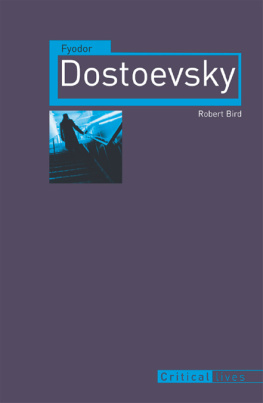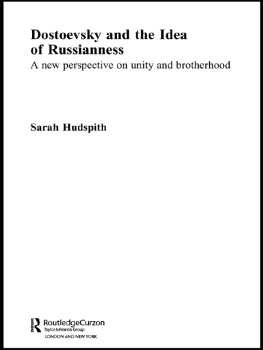DOSTOEVSKY
The adventurer
In humanity has not conceived of a race
Completely physical in a physical world.
Wallace Stevens, LEsthtique du Mal.
DOSTOEVSKY
The Seeds of Revolt
1821-1849
JOSEPH FRANK
PRINCETON UNIVERSITY
PRESS
Copyright 1976 by Princeton University Press
Published by Princeton University Press, Princeton, New Jersey
In the United Kingdom: Princeton University Press,
Chichester, West Sussex
All Rights Reserved
LIBRARY OF CONGRESS CATALOGING-IN-PUBLICATION DATA
Frank, Joseph, 1918
Dostoevsky: the seeds of revolt, 1821-1849.
Includes bibliographical references and index.
1. Dostoevskii, Fedor Mikhailovich, 1821-1881.
PG3328.F7 891.733 [B] 76-3704
ISBN 0-691-06260-9
ISBN 0-691-01355-1 (pbk.)
ISBN-13: 978-1-691-01355-8 (pbk.)
ISBN-10: 0-691-01355-1 (pbk.)
eISBN-13: 978-1-400-84444-9 (ebook)
R0
To my wife Guiguite,
Enfin!
and my daughters Claudine and Isabelle,
who grew up with Dostoevsky.
CONTENTS
ix
xi
xvi
LIST OF ILLUSTRATIONS
PREFACE
The present volume is the first of a series devoted to the life and works of Dostoevsky. As presently planned, it will be composed of four volumes, dealing, in chronological sequence, each with another period of Dostoevskys life. A complete version of the entire work already exists in draft, and I hope to be able to publish the remainder-other obligations permittingwithin a reasonable number of years.
The entire project originated about twenty years ago, when I was invited to give a series of lectures by the Christian Gauss Seminars at Princeton University. The Seminars were then under the chairmanship of E.B.O. Borgerhoff, soon to become a dear friend, and whose rare combination of debonair charm and scholarly seriousness still remains alive in the memory of those who knew him well. At that time I was very much interested in the new Existentialist literature making such a splash in the immediate postwar period, and I chose as my subject the topic, Existential Themes in Modern Literature. To provide some historical background, I began with an analysis of Dostoevskys Notes from Underground as a precursor of the mood and the themes that one found in French Existentialism. My interpretation of that work derived from the writings of Leo Shestov and Nikolay Berdyaev, and I stressed the irrationalism and amoralism of the underground man as he tragically and defiantly asserted the freedom of his personality in the face of the laws of nature, whatever the cost to himself and to others.
Even as I was expounding this view, though, I had the uneasy feeling that it was far from adequate. What it accentuated in the work was unquestionably there; but so was much else to which an Existentialist reading offered no clue whatever. When I began to write up my lectures, I decided to study Notes from Underground more thoroughly, and to investigate the social-cultural background that so obviously served as Dostoevskys point of departure. This led me to read whatever I could find about the period in the languages at my disposal, and finally, when the limitations of such sources became apparent, to learn Russian. As time went by, I realized that my interest in Existentialism had greatly diminished, while my fascination with Dostoevsky and Russian culture of the nineteenth century continued to grow by leaps and bounds. I abandoned the idea of writing up my lectures and decided instead to write a book on Dostoevsky. This was the far-away and almost accidental origin of the present book and its successorsthough I had no intention of writing a work on any such scale when I started out.
The intrinsic interest of the material, however, led me on further and further. And I gradually realized that, if I were to do justice to my vision of Dostoevsky, it would be necessary to present him in the context of a massive reconstruction of the social-cultural life of his period. For this vision may be summed up, briefly, by saying that I see Dostoevskys work as a brilliant artistic synthesis of the major issues of his time, a personal utterance, to be sure, but one, more than most, oriented by concerns outside himself. It is not simplyas we too often tend to think in the Westthe passionately febrile expression of an unbalanced but extraordinarily gifted temperament. Indeed, one way of defining Dostoevskys genius is to locate it in his ability to fuse his private dilemmas with those raging in the society of which he was a part.
My interest in Dostoevskys personal life is therefore strictly limited, and anyone who seeks a conventional biography in the following pages will be sorely disappointed. Numerous works of this kind already exist, and I never had any intention of adding still another to their number. I sketch in the background of the events of Dostoevskys private existence, but I deal at length only with those aspects of his quotidian experience which seem to me to have some critical relevance-only with those that help to cast some light on his books. My work is thus not a biography, or if so, only in a special sensefor I do not go from the life to the work, but rather the other way round. My purpose is to interpret Dostoevskys art, and this purpose commands my choice of detail and my perspective. It has always seemed to me paradoxical that what is of greatest interest about the life of an artistindeed, the only reason we are concerned with him at all, i.e., his worksare ordinarily scanted in the usual biography in favor of personal anecdote and the details of private life. Such a narrative may contribute to the study of human character, or to the social history of the period it depicts, but it usually leaves art in the background; or at best, treats it only as ancillary and as an adjunct to more fundamental life-experiences. I have adopted the opposite procedure of making Dostoevsky the man an adjunct to his artistic concerns and their products-a procedure which seems to me to correspond more accurately to the actual hierarchy of values in the life of any creative personality.
This does not mean that I see any unbridgeable gap between art and life; but this latter word can be taken on the level of lhomme moyen sensuel, or on that of an artist who lives equally at the level of mind, spirit, and consciousness. For this reason, rather than devoting space to the routine incidents of Dostoevskys day-to-day existence, I dwell much more on the social-cultural milieu in which he lived. It is from this milieu that he derived the ideas and values through which he assimilated whatever life-experiences came his way, and was enabled to transform them into the themes and technique of his art. I shall try to show that an exploration of his life from this point of view, on the plane of what Hegel would call the objective spirit of Dostoevskys time, can lead to, if not a totally different, then a far better understanding of the significance of his achievement. This is of course not a new approach to Dostoevsky, particularly in the Russian criticism of the last half-century, and I am conscious of a considerable obligation to such predecessors as Leonid Grossman, N. F. Belchikov, A. S. Dolinin, and V. L. Komarovich. I have tried to build on the foundations they have laid, and to put to good use a freedom of interpretation they were not always able to enjoy.
During the twenty or so years I have thought about this book- though only able to work on it intermittently because of the demands of a teaching career largely devoted to other subjectsI have of course accumulated a great many debts of gratitude towards those who have encouraged me to persist in what, all too often, seemed a quixotic undertaking. Several of those to whom I feel most grateful are now, alas, deceased: R. P. Blackmur, Alexandre Koyr, Erich Kahler, H. B. Parkes. Their active concern for my progress was a potent stimulus in moments of discouragement, and I shall never forget an approving letter from the first at a dark moment, a smiling remark from the second that opened a whole new horizon on an important problem, an enthusiastic telephone call from the third after reading a chapter. The fourth was a teacher and inspiration of my youth who became a companion in maturity, and I should have liked to present him with a copy of this volume that he never doubted would get written.













